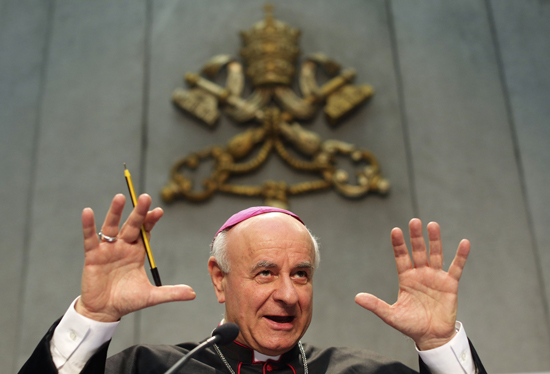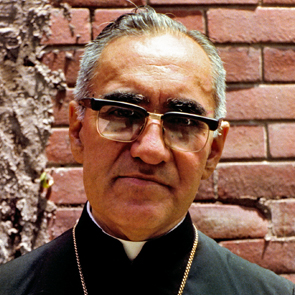Salvadoran Archbishop Oscar Romero will most likely be beatified in San Salvador within the next five months and canonised by 2017, according to a campaigner close to the martyred prelate’s cause for sainthood.
Julian Filochowski, head of the Archbishop Romero Trust, said he thought it likely that Pope Francis, who is known to be a supporter of the cause, would approve Romero’s canonisation without requiring the miracle usually necessary as evidence of sainthood.
Archbishop Vincenzo Paglia, the postulator or chief promoter of the archbishop's cause for sainthood, told journalists at a press conference on Wednesday that the two decades it took to obtain the decree were the result of "misunderstandings and preconceptions."
He was speaking the day after Francis formally recognised that the slain Salvadoran archbishop was killed "in hatred of the faith" and not for purely political reasons.
During Archbishop Romero's time as archbishop of San Salvador -- from 1977 to 1980 -- "kilos of letters against him arrived in Rome. The accusations were simple: He's political; he's a follower of liberation theology."
To the accusations that he supported liberation theology, Archbishop Paglia said, Archbishop Romero responded, "Yes, certainly. But there are two theologies of liberation: one sees liberation only as material liberation; the other is that of Paul VI. I'm with Paul VI," in seeking the material and spiritual liberation of all people, including from the sins of injustice and oppression.
All of the complaints, Archbishop Paglia said, slowed the sainthood process and "strengthened his enemies," who, he said, included the late Colombian Cardinal Alfonso Lopez Trujillo, who believed the Salvadoran archbishop tended toward Marxism and thought his canonisation would be seen as a canonisation of the materialistic, political form of liberation theology criticised by the Church.
 "This mountain of paper, unfortunately, weighed down" the cause, the archbishop said. But the Congregation for the Doctrine of the Faith examined all his homilies and writings and cleared them.
"This mountain of paper, unfortunately, weighed down" the cause, the archbishop said. But the Congregation for the Doctrine of the Faith examined all his homilies and writings and cleared them.
Promoters of the cause, he said, collected "a mountain of testimony just as big" to counter the accusations and to prove that Archbishop Romero heroically lived the Christian faith and was killed out of hatred for his words and actions as a Catholic pastor.
In the end, Archbishop Paglia said, both a panel of theologians working for the Congregation for Saints' Causes and the cardinals who are members of the congregation voted unanimously to recommend Pope Francis recognise Archbishop Romero as a martyr.
"He was killed at the altar," Archbishop Paglia said, instead of when he was an easier target at home or on the street. "Through him, they wanted to strike the Church that flowed from the Second Vatican Council."
Shooting him March 24, 1980, as he celebrated Mass in a San Salvador hospital chapel "was not caused by motives that were simply political," Archbishop Paglia said, "but by hatred for a faith that, imbued with charity, would not be silent in the face of the injustices that relentlessly and cruelly slaughtered the poor and their defenders."
Mgr Jesus Delgado Avecedo, Archbishop Romero's secretary and aide, said: "Today is a day of great celebration in El Salvador. The recognition of the sacrifice of Archbishop Romero represents for us Salvadorans another appeal to unity and peace. I am sure the upcoming beatification will set in motion the realisation of the great miracle of a fraternal encounter of all Salvadorans, overcoming every political, social and economic division."
Roberto Morozzo della Rocca, an Italian historian who wrote a biography of Archbishop Romero and helped Archbishop Paglia with the cause, said after years of research, he could find no proof that the archbishop said a phrase famously attributed to him by a Guatemalan journalist: "If they kill me, I shall rise again in the Salvadoran people. May my blood be the seed of liberty, my death for the liberation of my people."
Archbishop Paglia said that in December 2012 during his first and only private audience with Pope Benedict, the pope informed him that he had decided to "unblock" the cause and allow it to move forward.
"The martyrdom of Romero has given meaning and strength to many Salvadoran families who lost relatives and friends during the civil war," Archbishop Paglia said, and the church in El Salvador is beginning to collect information and testimony about their faith with the idea of proposing more saints' causes.
Top: Archbishop Romero. Above: Archbishop Paglia on Wednesday. Photos: CNS




 Loading ...
Loading ...